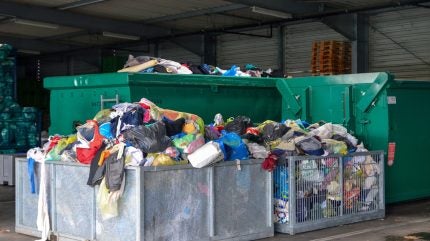
The Association for the Management of Textile and Footwear Waste – formed by major industry retailers such as Decathlon, El Corte Inglés, H&M, Ikea, Inditex, Kiabi, Mango, Primark, Sprinter/JD and Tendam – recently rebranded its SCRAP initiative (Collective System for Extended Producer Responsibility) as Re-Viste.
This new identity reflects the association’s aim to create a sustainable, circular economy for textile and footwear waste in Spain.
The association joined industry experts at the Royal Tapestry Factory recently to discuss the opportunities, challenges and progress toward establishing a new circular management system for textiles and footwear.
2025 pilot project: plan and implementation
The association announced the launch of a pilot project in 2025 that is designed to evaluate the system’s efficiency and effectiveness.
As part of the pilot, various methods for textile collection will be tested, including public containers on city streets, drop-off points at municipal recycling centres, and collection stations at private spaces such as shopping centres, shops, schools, and religious establishments.
Notably, these options will help expand the collection network to different environments tailored to different municipal contexts and facilitate citizen participation.
Once textiles are collected, they will be transported to sorting plants, where they will be evaluated following waste hierarchy principles. Items in good condition will be sold through secondhand shops, while textiles unsuitable for reuse will be classified according to their composition (such as cotton or polyester) to facilitate their subsequent recycling into new fabrics.
Project supervision, municipal involvement
The pilot is expected to last at least one year and will be supervised by the Monitoring Committee, composed of the FEMP Textile Waste Working Group and Re-Viste.
It will be tested in six municipalities representing different socio-demographic environments: two urban, two rural and two semi-urban with a total population of around 300,000.
The project aims to produce a guide of recommendations that will include the good practices identified to offer local authorities tools and guidelines that will enable them to successfully implement the selective collection of textiles in their territories.
Re-Viste CEO Juan Ramón Meléndez emphasised the importance of collaboration: “The system we are creating will not only facilitate the management of textiles but will also promote a sustainable model that involves all the actors in the value chain. Collaboration and participation are key to making the circular textile economy effective, allowing each person and company to contribute to a more efficient and innovative future.”
What do the industry insiders think?
Commissioner for the Circular Economy at the Ministry for Ecological Transition and the Demographic Challenge, Alejandro Dorado, stressed the importance of the Re-Viste pilot project: “The textile sector plays a fundamental role and has a very important weight in our country since it represents 3% of the GDP, 8% of imports and has a turnover of 15,000m. With the creation of Re-Viste, you are demonstrating an incredible capacity to unite different actors and leave the door open to new ones for this transformation of the sector.”
Meléndez echoed this sentiment, highlighting the pilot project as a critical step in fostering collaboration among key industry players.
Meléndez said: “This pilot project is an important step towards bringing together all the key players and working together to create an efficient and sustainable system that allows for the proper collection of textiles and footwear, in line with regulatory challenges and society’s demand. Since the association was founded in 2023, our goal has always been to enable the transition to a more efficient model for managing this waste, and this pilot will help us move in that direction.”
Cristina Montalvá Medina, director general of equality and local policies at FEMP (Spanish Federation of Municipalities and Provinces) emphasised the importance of designing a system that fits each municipality’s specific needs: “It is essential to create a quality system that adapts to the specific needs of each municipality, providing citizens with an efficient collection service. We must not forget that they are key to the proper functioning of the system, so it is essential to look after them.”
Other industry leaders, including Alberto Alberich, director of Moda Re; Carmen Redondo, director of Institutional Relations at Hispacoop’ and Ana Rodes, director of Sustainability at Recover, collectively agreed on the importance of Spain developing a strong recovery sector that allows for the creation of a circular economy around textiles and footwear.
Last month (September) research suggested Bangladesh could incentivise the “highly informal” post-industrial textile waste (Jhut) economy and trade which it has been reportedly missing out on due to a lack of a comprehensive policy framework on circular textiles.



